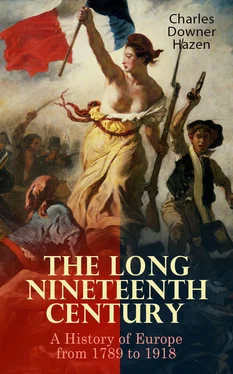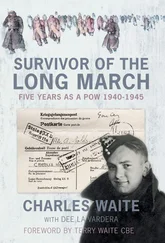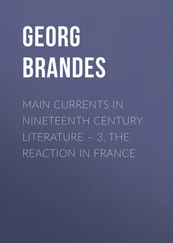It brought about the fall of Robespierre. This hideous measure united his enemies, those who feared him because they stood for clemency, and those who feared him because, though Terrorists themselves, they knew that he had marked them for destruction. They could lose no more by opposing him than by acquiescing, and if they could overthrow him they would gain the safety of their heads. Thus in desperation and in terror was woven a conspiracy not to end the Terror, but to end Robespierre.
The storm broke on July 27, 1794 (the 9th of Thermidor). When Robespierre attempted to speak in the Convention, which had cowered under him and at his demand had indelibly debased itself by passing the infamous law of Prairial, he was shouted down. Cries of "Down with the tyrant!" were heard. Attempting to arouse the people in the galleries, he this time met with no response. The magic was gone. There was a confused, noisy struggle, lasting several hours. Robespierre's voice failed him. "Danton's blood is choking him!" exclaimed one of the conspirators. Finally the Convention voted his arrest and that of his satellites, his brother, Saint-Just, and Couthon.
All was not yet lost. The Revolutionary Tribunal was devoted to Robespierre and, if tried, there was an excellent chance that he would be acquitted. The Commune likewise was favorable to him. It took the initiative. It announced an insurrection. Its agents broke into his prison, released him, and bore him to the City Hall. Thereupon the Convention, hearing of this act of rebellion, declared him and his associates outlaws. No trial therefore was necessary. As soon as re-arrested he would be guillotined. During the evening and early hours of the night a confused attempt to organize an attack against the Convention went on. But a little before midnight a drenching storm dispersed his thousands of supporters in the square. Moreover Robespierre hesitated, lacked the spirit of decision and daring. The whole matter was ended by the Convention sending troops against the Commune. At two in the morning these troops seized the Hotel de Ville and arrested Robespierre and the leading members of the Commune. Robespierre had been wounded in the fray, his jaw fractured by a bullet.
He was borne to the Convention, which declined to receive him. "The Convention unanimously refused to let him be brought into the sanctuary of the law which he had so long polluted," so ran the official report of this session. That day he and twenty others were sent to the guillotine. An enormous throng witnessed the scene and broke into wild acclaim. On the two following days eighty-three more executions took place.
France breathed more freely. The worst, evidently, was over. In the succeeding months the system of the Terror was gradually abandoned. This is what is called the Thermidorian reaction.The various branches of the terrible machine of government were either destroyed or greatly altered. A milder regime began. The storm did not subside at once, but it subsided steadily, though not without several violent shocks, several attempts on the part of the dwindling Jacobins to recover their former position by again letting loose the street mobs. The policy of the Convention came to be summed up in the cry "Death to the Terror and to Monarchy!" The Convention was now controlled by the moderates but it was unanimously republican. Signs that a monarchical party was reappearing, demanding the restoration of the Bourbons, but not of the Old Regime, prompted the Convention to counter-measures designed to strengthen and perpetuate the Republic.
To accomplish this and thus prevent the relapse into monarchy, the Convention drew up a new constitution, the third in six years. Though the radicals of Paris demanded vociferously that the suspended Constitution of 1793 be now put into force, the Convention refused, finding it too "anarchical" a document. Instead, it framed the Constitution of 1795 or of the Year Three. Universal suffrage was abandoned, the motive being to reduce the political importance of the Parisian populace. Democracy, established on August 10, was replaced by a suffrage based upon property. There was practically no protest. The example of the American states was quoted, none of which at that time admitted universal suffrage. The suffrage became practically what it had been under the monarchical Constitution of 1791. The national legislature was henceforth to consist of two chambers, not one, as had its predecessors. The example of America was again cited. "Nearly all the constitutions of these states," said one member, "our seniors in the cause of liberty, have divided the legislature into two chambers; and the result has been public tranquility." It was, however, chiefly the experience which France had herself had with single-chambered legislatures during the last few years that caused her to abandon that form. One of the chambers was to be called the Council of Elders. This was to consist of 250 members, who must be at least forty years of age, and be either married or widowers. The other, the Council of the Five Hundred, was to consist of members of at least thirty years of age. This council alone was to have the right to propose laws, which could, however, not be put into force unless accepted by the Council of Elders.
The executive power was to be exercised by a Directory, consisting of five persons, of at least forty years of age, elected by the Councils, one retiring each year. The example of America was again recommended but was not followed because the Convention feared that a single executive, a president, might remind the French too sharply of monarchy or might become a new Robespierre.
The Constitution of 1795 was eminently the result of experience, not of abstract theorizing. It established a bourgeois republic, as the Constitution of 1791 had established a bourgeois monarchy. The Republic was in the hands, therefore, of a privileged class, property being the privilege.
But the Convention either did not wish or did not dare to trust the voters to elect whom they might desire to the new Councils. Was there not danger that they might elect monarchists and so hand over the new republican constitution to its enemies? Would the members of the Convention, who enjoyed power, who did not wish to step down and out, and yet who knew that they were unpopular because of the record of the Convention, stand any chance of election to the new legislature? Yet the habit of power was agreeable to them. Would the Republic be safe? Was it not their first duty to provide that it should not fall into hostile hands?
Under the influence of such considerations the Convention passed two decrees, supplementary to the constitution, providing of the two-thirds of each Council should be chosen from the present members of the Convention.
The constitution was overwhelmingly approved by the voters to whom it was submitted for ratification. But the two decrees aroused decided opposition. They were represented as a barefaced device where-by men who knew themselves unpopular could keep themselves in power for a while longer. Although the decrees were finally ratified, it was by much smaller majorities than had ratified the constitution. The vote of Paris was overwhelmingly against them.
Nor did Paris remain contented with casting a hostile vote. It proposed to prevent this consummation. An insurrection was organized against the Convention, this time by the bourgeois and to the wealthier people, in reality a royalist project. The Convention intrusted its defense to Barras as commander-in-chief. Barras, who was more a politician than a general, called to his aid a little Corsican officer twenty-five years old who, two years before, had helped recover Toulon for the Republic. This little Buona-Parte, for this is the form in which the famous name appears in the official report of the day, was an artillery officer, a believer in the efficacy of that weapon. Hearing that there were forty cannon in a camp outside the city in danger of being seized by the insurgents, Bonaparte sent a young dare-devil cavalryman, Joachim Murat, to get them. Murat and his men dashed at full speed through the city, drove back the insurgents, seized the cannon and dragged them, always at full speed, to the Tuileries, which they reached by six o'clock in the morning. As one writer has said, "Neither the little general nor the superb cavalier dreamed that, in giving Barras cannon to be used against royalists, each was winning a crown for himself."
Читать дальше












